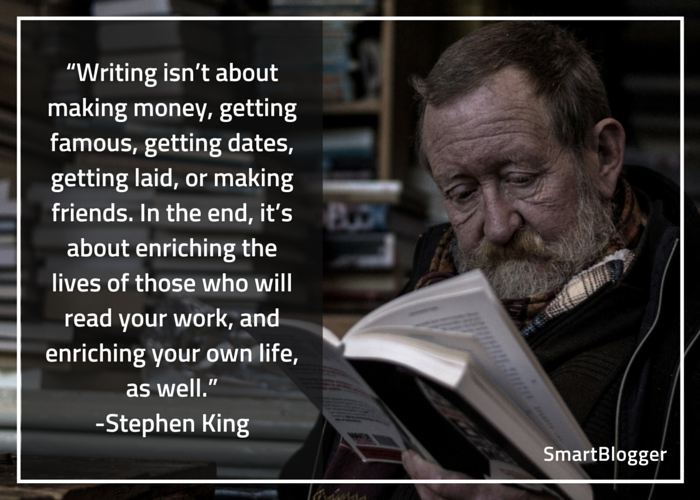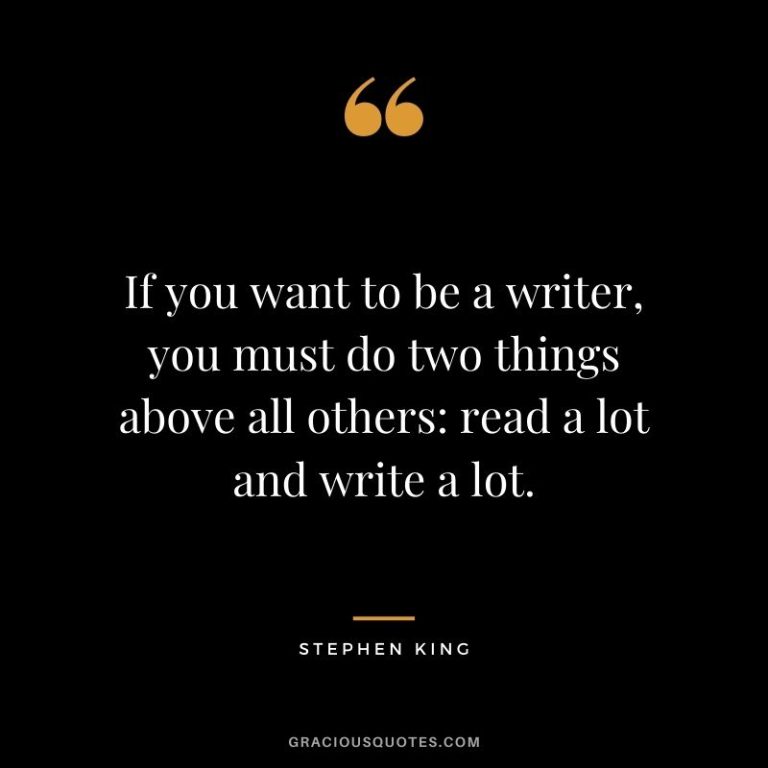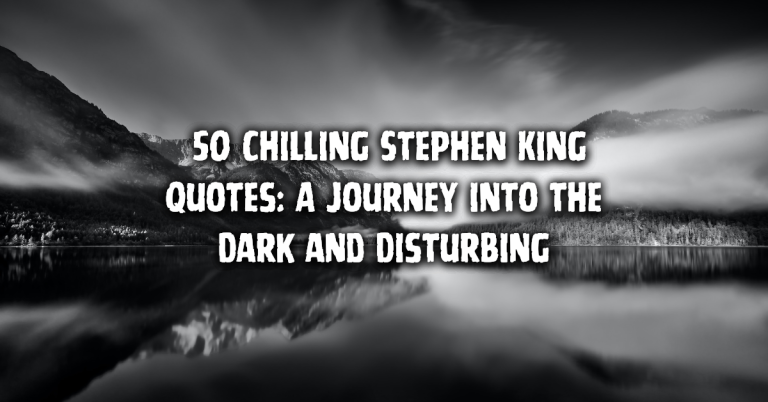Stephen King Quotes: Lessons In Writing Effective Horror Scenes
If you’re a fan of horror writing, then you’ve likely heard of the legendary Stephen King. With his masterful storytelling and ability to create bone-chilling scenes, King has become a household name in the world of horror literature. But what can we learn from his writing that can help us create effective horror scenes of our own? In this article, we’ll dive into some of Stephen King’s most insightful quotes and uncover the valuable lessons they teach us about crafting terrifying tales. So grab your pen and paper, and get ready to take notes on how to send shivers down your readers’ spines!
Stephen King once said, “The scariest moment is always just before you start.” This quote reminds us that building suspense and anticipation is crucial for effective horror scenes. By creating a sense of unease and tension, we can make our readers feel on edge, keeping them engaged and eager to find out what happens next. King’s words serve as a reminder to embrace the fear and dive headfirst into our writing, knowing that the most frightening moments often come from pushing past our comfort zones. So, let’s explore the dark recesses of our imagination together and discover the secrets to writing bone-chilling horror scenes that will haunt our readers long after they’ve turned the final page.

Stephen King Quotes: Lessons in Writing Effective Horror Scenes
Stephen King is a renowned author known for his mastery of the horror genre. His ability to create terrifying and captivating scenes has made him a literary icon. In this article, we will explore some of Stephen King’s quotes that offer valuable lessons in writing effective horror scenes. Whether you’re an aspiring horror writer or simply a fan of King’s work, these insights will help you understand the art of crafting spine-chilling narratives.
Understanding the Power of Fear
Stephen King once said, “We make up horrors to help us cope with the real ones.” This quote encapsulates the essence of horror writing. Horror stories allow readers to confront their fears in a controlled environment, providing a cathartic experience. Effective horror scenes tap into deep-seated anxieties and evoke visceral emotions in readers. By understanding the power of fear, writers can create narratives that resonate with their audience.
To write effective horror scenes, it’s crucial to identify the core fears that drive the story. Whether it’s the fear of the unknown, the fear of death, or the fear of isolation, these primal emotions form the foundation of a compelling horror narrative. By tapping into these fears, writers can create scenes that elicit a strong emotional response from readers.
Building Tension and Suspense
One of the key elements of a successful horror scene is the ability to build tension and suspense. Stephen King emphasized the importance of pacing in horror writing, stating, “The most important things are the hardest things to say. They are the things you get ashamed of because words diminish your feelings.” This quote highlights the challenge of effectively conveying intense emotions through words alone.
To build tension, writers can employ various techniques such as foreshadowing, withholding information, and creating a sense of impending doom. By gradually escalating the stakes and heightening the sense of danger, writers can keep readers on the edge of their seats. This allows for a more immersive and thrilling reading experience.
In addition to pacing, the use of descriptive language plays a crucial role in creating an atmosphere of dread. Stephen King famously said, “Description begins in the writer’s imagination, but should finish in the reader’s.” By painting vivid and evocative images, writers can transport readers into the heart of the horror scene, making them feel as though they are experiencing the terror firsthand.
Crafting Memorable Villains
A memorable villain is a cornerstone of any successful horror story. Stephen King emphasized the importance of creating fully fleshed-out antagonists, stating, “Monsters are real, and ghosts are real too. They live inside us, and sometimes, they win.” This quote highlights the notion that the most compelling villains are often a reflection of our own darkest fears and desires.
When crafting a villain, it’s essential to delve into their motivations and backstory. Understanding what drives the antagonist allows writers to create multidimensional characters that resonate with readers. Additionally, giving villains relatable qualities can make them even more terrifying, as it blurs the line between good and evil.
Utilizing the Power of Imagination
Stephen King believes that the power of imagination is integral to effective horror writing. He once said, “Imagination is the vehicle that allows us to glimpse the uncanny, to glimpse the otherworldly, and to glimpse the darkness that lies within ourselves.” This quote emphasizes the role of imagination in creating truly horrifying and memorable scenes.
By tapping into their own imagination, writers can push the boundaries of what is perceived as normal and explore the depths of human psyche. This allows for the creation of unique and chilling scenarios that will captivate readers. Imagination opens the door to a world of possibilities, enabling writers to craft stories that linger long after the final page is turned.
In conclusion, Stephen King’s quotes offer valuable insights into the art of writing effective horror scenes. By understanding the power of fear, building tension and suspense, crafting memorable villains, and utilizing the power of imagination, writers can create narratives that leave readers trembling with anticipation. Stephen King’s mastery of the horror genre serves as a guide for aspiring writers, helping them unlock the secrets of captivating storytelling. So, take these lessons to heart and embark on your own journey to create spine-chilling horror scenes.
Key Takeaways: Stephen King Quotes – Lessons in Writing Effective Horror Scenes
- Creating suspense is crucial in horror writing – Stephen King emphasizes the importance of building tension to keep readers on the edge of their seats.
- Characters should be relatable – King advises writers to develop realistic and complex characters that readers can connect with emotionally.
- Imagination is key – According to King, the scariest horror scenes are often left to the reader’s imagination, allowing them to conjure up their own terrifying images.
- Focus on atmosphere – King recommends setting the right atmosphere to enhance the horror experience, using details to create a vivid and unsettling environment.
- The element of surprise – King encourages writers to introduce unexpected twists and turns in their horror scenes, keeping readers guessing and engaged.
Frequently Asked Questions
What are some Stephen King quotes on writing effective horror scenes?
Stephen King, the master of horror, has shared many insightful quotes on writing effective horror scenes. Here are a few of his notable quotes:
“The scariest moment is always just before you start. After that, things can only get better.”
This quote reminds us that the anticipation of a scary moment is often more terrifying than the actual event. It encourages writers to push through their fears and dive into the writing process.
“Monsters are real, and ghosts are real too. They live inside us, and sometimes, they win.”
This quote emphasizes the power of internal fears and emotions in horror writing. It encourages writers to tap into their own fears and vulnerabilities to create truly haunting and relatable horror scenes.
How can Stephen King’s quotes help writers in crafting effective horror scenes?
Stephen King’s quotes can be a valuable source of inspiration and guidance for writers looking to craft effective horror scenes. Here’s how his quotes can help:
1. Motivation: King’s quotes can motivate writers to overcome their fears and start writing. They remind writers that even the master of horror had moments of doubt, but he pushed through and created iconic stories.
2. Understanding fear: King’s quotes often explore the nature of fear and its impact on storytelling. By studying his quotes, writers can gain a deeper understanding of what makes a horror scene truly terrifying and use that knowledge to enhance their own writing.
What lessons can writers learn from Stephen King’s quotes on writing horror scenes?
Stephen King’s quotes offer valuable lessons for writers looking to improve their horror writing skills. Here are a few lessons we can learn:
1. Embrace vulnerability: King emphasizes the importance of tapping into personal fears and vulnerabilities to create authentic horror scenes. Writers should be willing to explore their own fears and use them as a basis for their storytelling.
2. Create anticipation: King’s quote about the scariest moment being just before you start highlights the power of anticipation in horror writing. Writers should build suspense and tension to heighten the impact of their horror scenes.
How can writers apply Stephen King’s advice to their own horror writing?
Writers can apply Stephen King’s advice to their own horror writing in the following ways:
1. Start writing: King’s quote about the scariest moment being just before you start is a reminder to overcome writer’s block and dive into the writing process. Writers should push through their fears and start writing, even if it feels daunting.
2. Explore personal fears: King’s emphasis on personal fears can inspire writers to dig deep and explore their own vulnerabilities. By tapping into their own fears, writers can create more authentic and relatable horror scenes.
Can Stephen King’s quotes be applied to other genres of writing?
While Stephen King’s quotes primarily focus on horror writing, many of his insights can be applied to other genres as well. For example, his advice to embrace vulnerability and create anticipation can benefit writers in various genres. Additionally, his quotes about the writing process and overcoming self-doubt can resonate with writers across different genres.
Even if you’re not writing horror, there is still much to learn from Stephen King’s wisdom and apply it to your own writing journey.
Stephen King on writing; why he never uses a notebook and other tips from the top!
Final Summary: Unleash Your Horror Writing Potential with Stephen King Quotes
Stephen King, the master of horror, has left us with a treasure trove of wisdom when it comes to writing effective horror scenes. From his chilling novels to his insightful quotes, we have learned valuable lessons on how to captivate readers and create spine-tingling experiences. By incorporating these lessons into our own writing, we can take our horror stories to new heights and leave a lasting impact on our audience.
One of the key takeaways from Stephen King’s quotes is the importance of tapping into our fears and anxieties. By delving into the depths of our own emotions, we can uncover the raw material needed to craft truly terrifying tales. King reminds us that horror is not just about blood and gore, but rather about exploring the psychological and emotional aspects that make our skin crawl. By infusing our stories with relatable fears and vulnerabilities, we can connect with readers on a deeper level and evoke genuine terror.
Another crucial lesson we can learn from Stephen King is the power of vivid descriptions and sensory details. Through his quotes, he emphasizes the need to paint a vivid picture in the reader’s mind, using all five senses to create a fully immersive experience. By carefully selecting our words and employing sensory imagery, we can transport our readers into the heart of our horror scenes, making them feel as if they are right there, experiencing the terror firsthand.
In conclusion, Stephen King’s quotes provide invaluable insights and guidance for aspiring horror writers. By embracing our fears, honing our descriptive skills, and infusing our stories with emotional depth, we can create truly effective and chilling horror scenes. So, let Stephen King be our guide as we embark on our own journeys into the realm of horror, armed with the tools and inspiration to captivate and terrify our readers.





